#geraint and enid
Explore tagged Tumblr posts
Text
Gwalchy/Geraint comparison
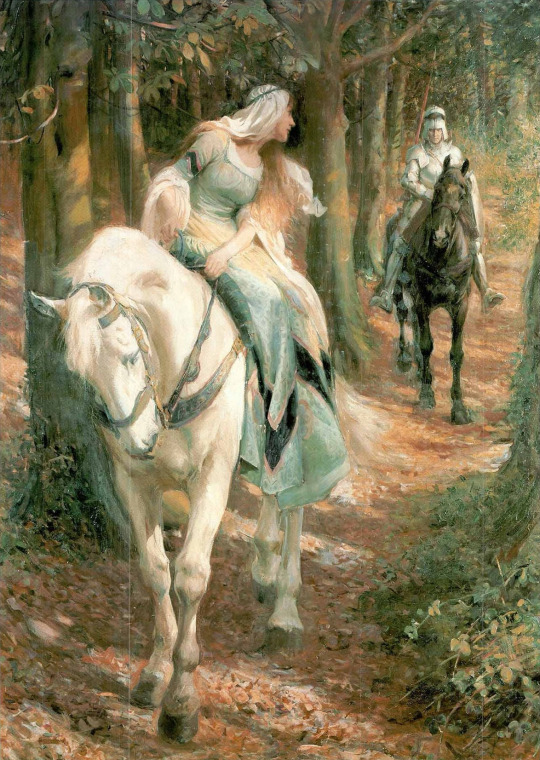
Shwmae! Back on my bullshit once again!! Gonna be talking about Gwalchmai, and Geraint, while also comparing them, cuz it's fun and I read an essay that made me freak out.
Firstly, some background:
What is a Penteulu?
‘The medieval household surrounding a Welsh lord,’ writes Sean Davies, ‘was one of the key Welsh institutions throughout the Middle Ages.’ A teulu - or family - was essentially a household army attached to a lord, or king. Not all members of the Teuluoedd were of high status, and they were entitled to any booty won on campaign. The Penteulu, or ‘head of the family’, was the commander of said force. It was his job to ‘maintain discipline and harmonious relations within the teulu to ensure its effectiveness,’ as well as ‘mustering and organising the teulu for any given campaign or raid.’ Furthermore, the laws demeaned specific duties from him: he was to accompany the king or prince at all times - sort of like a proto-bodyguard - and be ready to do his bidding, only leaving his monarch’s side when performing an errand for him.
The position of Penteulu was held in high esteem as it allowed unfettered access to the king or lord. This meant that the position was highly coveted as he was ‘one of the king's chief ministers,’ equal to a distain, or steward. (Distain’s could sometimes be like a proto-prime minister, like in the case of Ednyfed Fychan!) The role of Penteulu, therefore, went to a kinsman of the lord or king. (Owain Gwynedd made his son, Hywel, Penteulu of his forces in 1157 when Henry II led an ill-fated expedition on Anglesey.’)
So, with that out of the way, onto Gwalchy and Geraint!
First off, Gwalchmai is, I would argue, a main character within the three Arthurian Romances included in The Mab. With this in mind, I'll try and only refer to him just in his appearance in ‘Geraint ac Enid,’ but, if they're relevant, I'll chuck in refs to Owain and Peredur. Also, pls note, I am biased in my opinion towards Geraint, so bear that in mind. I'll try to be as objective as possible, but yeah.
Now, at the start of G+E, Geraint is a ‘junior knight.’ He holds no office of import unlike say Cai, Gwalchmai, or even Peredur. As the Knight of the Sparrowhawk's dwarf notes: ‘your status is not high enough to entitle you to speak to my lord.’ This puts him on a lower pedestal than Edern - and his retinue - as well as Gwenhwyfar. This can be seen in the blatantly deferential tone that he takes up when speaking to Gwen at the start of the tale, and the fact that it is she who enquires of him why he did not hunt with ‘his lord.’
Much is also made of Geraint's lands and holdings within the first half of the tale and, when he fucks off back to Cornwall in order to take them up from his father, you could say that this is when the real problems begin for him. Geraint is easily insulted as can be seen from his reactions to the dwarf, Edern, and, most importantly, his own wife.
This stands in sharp contrast to Gwalchmai. Much is made of his ‘golden-tongue’ and courteous nature within all three Arthurian Romances within The Mabinogion, and ‘Geraint ac Enid’ is no exception.
He is immediately concerned by Geraint and, presumably, Enid's appearances when they reunite in the forest where Arthur's pavilion is situated, as well as when Cai brings news of there being ‘a wounded knight’ who has been ‘seen in the forest there wearing armour that's in poor condition.’ Upon hearing this - as well as the fact that said knight beat Cai shitless - Gwalchmai goes to meet with him and address the slight that Cai committed.
It is Gwalchmai then who ensures that Geraint and Enid receive care - medical or otherwise - from Arthur’s court, as well as, perhaps more pertinently, smoothing over Cai and Geraint’s spat. In this he would be doing his duty as his lord's Penteulu in smoothing over disputes that erupted within the court/within the ranks of his teulu. It is not much of a stretch to assume that Geraint is - at this point - still in service to his lord, and, therefore, bound to his will – which has been carried out by Gwalchmai.
It is also he who sends a squire to ‘tell Arthur that Geraint was there,’ and to ‘ask Arthur if he will move his tent closer to the road for [Geraint] won't come to see him of his own free will.’ In doing this Gwalchmai upholds the harmony of the Penteulu as well as his lord's will, while also enabling Geraint’s wounds to heal.
This system of redress and addressing conflict is one of the key tenets of Cyfraith Hywel - or The Laws of Hywel Dda. Three copies of said laws are extant - the Cyfnerth, Blegywryd, and Iorwerth and all have their own redactions within the texts. These are ‘the principal… Codifications of Welsh Law.’ All set down ‘a series of tractates’ that deal with the Laws of Court, Laws of the Country, and also include the Justices’ Test Book, although no text is similar to another. It is no accident then that the Mab as a whole deals with conflict and the ways it can both destroy and be soothed. Each of the Arthurian texts deals with an insult done towards somebody, be it queen, knight, lady, or lord, and ‘Geraint’ is perhaps the clearest in bringing that to the fore.
Geraint's receival of a blow from the dwarf after Gwenhwyfar's maid has been similarly struck is the first to address this. Geraint reflects that ‘it would be no vengeance for him to slay the dwarf and have the armed horseman take him cheaply and without arms.’ Therefore he must avenge the wrong done to both him and the queen by the Knight of the Sparrowhawk through other means - a tournament.
Like Cai, Geraint is rash. He changes into most of his adventures with nary a care, and also takes immense satisfaction from them. He seeks to increase his own glory by winning tournaments and booty - for example, the horses he gathers from the slain knights - while also both grievously wounding Edern, and, although the text does not state it, inflicting serious psychological damage on Enid. It is he who allows her to be treated so cruelly by himself and other men, and in doing so exposes the complex views Welsh men had about women.
I have talked about this before but in Welsh society ‘an insult to a woman was an insult against her husband and male relatives.’ It ‘called into question their ability to defend their women,’ and cast serious doubt upon their family honour. Not being able to protect their women was, arguably, seen as the worst thing a man could do. Michael Cichon has even suggested that that is why Welsh Arthuriana has no affair angle. It was unnecessary. An audience would've been just as aware of Arthur's failures because of his inability to retaliate against the affronts done to his wife - and him - for it suggests a ‘similar impotence’ to a Welsh audience the way the act of cuckoldry would to an Norman one. It's no accident that in all three Romances Gwenhwyfar is the main target for dishonour. Her honour is paramount for both the King and the kingdom's wellbeing.
In dragging Enid with him - ostensibly in recompense for her supposedly ‘contemplating love for another man instead of him’ - Geraint has, in fact, insulted not just her, but her family, and, furthermore, the queen herself. In abusing one of the queen's ladies, Geraint himself has committed an offence equal to that of the dwarf’s, and so would’ve been made to pay a sarhâd (a fine) for this.
As Jacob Michaud Black notes, ‘women are an unimpeachable excuse for a feud, whenever it can be held that a woman's reputation has been compromised.’ Geraint - in his own way - has created a feud in his mind and it is both the court and Gwalchmai’s task to set him right. They must ‘repair’ the bond between him and his wife. (Repairing in sarcasm quotes because GERAINT, THERE'S NO EXCUSE! I’m eating him alive. May he dessicate from the inside out and rats feast on his bloated corpse.) Furthermore, this is my own interpretation, but nothing much is made of his apparent reconciliation with his wife. The text does not treat it with as much gravity as it ought. Geraint sees that ‘Enid had lost her colour and appearance’ and acknowledges that she ‘was in the right’ but - although he does avenge the insult done by the lord who ‘clouted her on the ear’ - he does not fully strive for forgiveness from her. After all, he has committed a greater fault than said lord in abusing his queen's lady and his own wife.
Now, Gwalchmai is the one who advises both Geraint and Arthur on how exactly to redress and harmonise their courts. ‘It is best for you to satisfy the suitors today, and receive the homage of your men today,’ he says to Geraint once they have arrived in Cornwall. Geraint, for once, wisely follows this advice. Moreover, he is positioned as an advisor to the other members of the teulu within ‘Owain’ suggesting that they break Owain out of jail or avenge him if he's been slain. This fits within the realm of a penteulu’s job description, and much is made of said prudent council within the Welsh poetical tradition.
The Triads, for example, position him as one of the Three men who were ‘Most Courteous to Guests and Strangers’ while, in all three Welsh Romances, it is he who reconciled hero and court through words where others (Cai, my beloved) have failed. As O.J. Padel states in ‘Arthur in Medieval Welsh Literature,’ Gwalchmai was ‘used as an honourable comparison’ in a poem by the poet Cynddelw for his patron Owain Gwynedd, in the twelfth century. ‘Taerualch ual Gwalchmai’ or fervently strong like Gwalchmai, while his reputation for courtesy is further alluded to by his epithet ‘tafod aur’ or golden-tongue.
Geraint too is also mentioned within Welsh poetry- although the elegy written for him is for the historical Geraint. ‘Yn Llongborth llas y Arthur, gwyrdewr kymynynt a dur,’ or in Longborth they were killed, Arthur's loss, brave men, they struck down with steel. ‘This poem,’ Padel states 'is of interest … since a later section dwells on horses which took part in the battle.’ In his romance, Geraint gathers a collection of horses from the knights he has killed on his and Enid's journey and it is this intertwining or alluding that is so fascinating. Evidently whoever wrote or transcribed G+E had some inkling of this poem. Perhaps it was a tongue-in-cheek reference to it?
This interlinking of ‘history’ and poetry is intriguing as it allows us a glimpse into how the melting pot of Welsh Arthuriana came into being. Mythological figures - like Arthur, Gwalchmai, Cai, and Gwenhwyfar - enmesh with historical figures, or at least give basis to their mythological counterparts. Perhaps they used these stories as a way to remember facets of great leaders or venerate them in some way.
I've mentioned before that bards were the keepers of history as well as the primary sources for stories. Could it be a similar case to The Iliad where fact and fiction mixed? There are traces of fact and fiction mixed into Geraint and Gwalchmai. Gwalchmai is seen as a figure to emulate within the corpus of Welsh Arthuriana, so much so that he's a shorthand for honour well into the twelfth century. Geraint, meanwhile, offers a look into both the complexity of Welsh laws and how Ards could - and maybe did - certain aspects of story and history things together. (Not to say that I think any Arthurian character or tale is historical. I merely mean in terms of the Arthurian sandbox certain historical personages were drawn upon. As Sioned Davies notes in her intro to The Mabinogion ‘they have been completely adapted to the native culture, and remain stylistically and structurally within the Welsh narrative tradition.’) These tales are ‘not merely written versions of oral narratives, but rather the works of authors using and shaping traditional material for their own purposes,’ and are vitally important in our understanding about Welsh culture.
Sources
Sioned Davies - The Mabinogion'
Michael Cichton - Insult and Redress in Cyfraith Hywel Dda and The Mabinogion
Sean Davies - War and Society in Medieval Wales (633 - 1283)
Natalia I. Petrovskaia - Edling or Penteulu? Ambiguities in the Status of Gwalchmai, Nephew of Arthur
Cyfraith Hywel Dda
O.J. Padel - Arthur in Medieval Welsh Literature
Jacob Michaud Black - Cohesive Force: Feud in the Mediterranean and the Middle East
#arthuriana#welsh mythology#the mabinogion#welsh myth#mabinogion#arthurian legend#y mabinogi#geraint and enid#geraint ac enid#geraint ap erbin#lady enid#sir geraint#gwalchmai ap gwyar#sir gawain#arthurian mythology#arthurian essay#arthurian literature#enid ferch ynwyl#the laws of hywel dda#queen guinevere#gwenhwyfar ferch ogrfan fawr#king arthur#the mabinogi
63 notes
·
View notes
Text

What a hard-hearted young man, hard-hearted you must be / You must have had a heart of any stone / For to say that you would murder that fair and pretty maid / When she doted the ground that you walked on.
[geraint and enid for @mortiscausa’s ’march to camelot,’ for the prompt ‘power’]
#em draws stuff#march to camelot#arthurian things#arthuriana#geraint and enid#erec et enide#erec and enid#<- there that should cover it.#MARCH IS NOT OVER UNTIL I SAY IT'S OVER. did this entirely while at the woodkiln firing yesterday which was. An Experience.#am just about to fall over from exhaustion (writing this post at 2am to post morningside as is my habit)#so there will be but little commentary to-night#the coloring was a struggle and I think it doesn't look as nice in my more cool-lit room as it did in the orange fiery kiln shed#but some of that is also the ipad-to-computer transfer :(#caption lyrics from the broomfield wager. goodbye now.
46 notes
·
View notes
Text



Bust of Enid, from a sculpture by F. Miller, by Copeland and Garrett, 1861
#lady enid#queen enid#arthuriana#arthurian mythology#arthurian legend#arthurian legends#geraint and enid#welsh mythology#AAAAAAAAHHHHHH LOOK AT HER LOOK AT WHAT I FOUND#SHE'S SO BEAUTIFUL
18 notes
·
View notes
Text

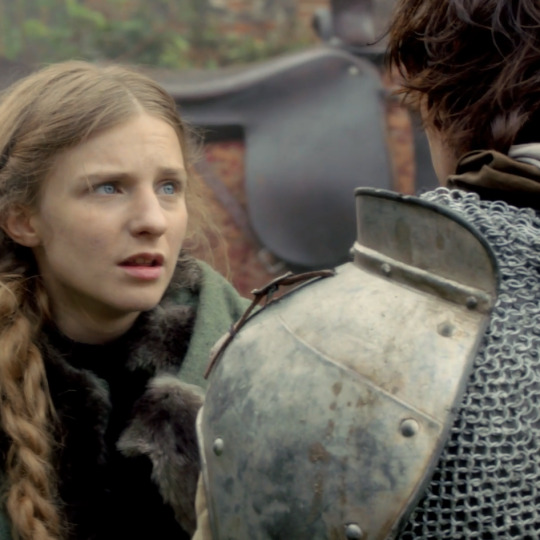

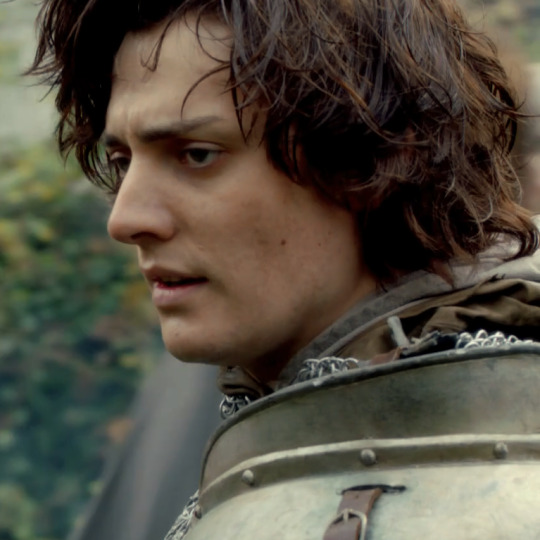





Three Welsh Romances: Geraint and Enid
Due to a misunderstanding, Geraint believes that Enid has cheated on him, and commands her not to speak to him during their journey. But she proves her fidelity by breaking her silence to save his life.
First Romance and Third Romance
35 notes
·
View notes
Text
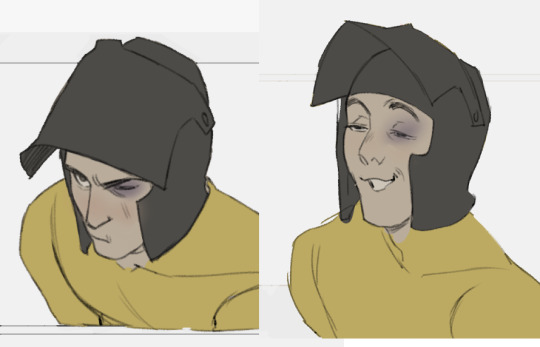
some in progress things
#edern ap nudd#yder son of nut#arthuriana#the mabinogion#welsh mythology#geraint and enid#art tag#work in progress#digital art#artists on tumblr#edern fucked around and found out
29 notes
·
View notes
Text

Enid and Geraint by Rowland Wheelwright
#enid#geraint#art#rowland wheelwright#arthurian#romance#romantic#chivalry#chivalric romance#knight#knights#folklore#britain#medieval#middle ages#history#armour#enide#british#europe#european#horses#pathway#forest#wood#woods#woodland#love
5K notes
·
View notes
Text
The people who are with Arthur in Avalon or are in a Cave alongside him:
(Disclaimer: Not including Morgan, the other fairies and/or Merlin)

La Bataille Loquifer: Gawain, Ywain, Percival and Guinevere (Guest Star: Roland from the Charlemagne series)

Lanzelet: Lout (Loholt)

Craig-y-Ddinas: Ywain, Kay, Bedivere, Gawain, Percival, Geraint/Erec, Tristan, Culhwch, Yder and Calogrenant (Source: The Welsh Fairy Book, by Willaim Jenkyn Thomas)

Sewingshields Folklore: Guinevere
Tally:
Queen Guinevere: 2
Sir Gawain: 2
Sir Ywain: 2
Sir Percival: 2
Sir Loholt: 1
Sir Kay: 1
Sir Bedivere: 1
Sir Geraint/Erec: 1
Sir Yder/Edern ap Nudd: 1
Sir Tristan: 1
Sir Culhwch: 1
Sir Calogrenant: 1
In the end, Arthur won't be alone...
Of course, none of the later French characters - Lancelot, Bors, Galahad, Palamedes, Dinadan, etc. - made it to Avalon or the Enchanted Cave. It's the older tradition characters who have a chance.
#king arthur's messianic return#king arthur#queen guinevere#loholt#sir gawain#sir ywain#sir kay#sir bedivere#sir percival#geraint#erec#sir tristan#Sir Yder#culhwch#sir calogrenant#edern ap nudd#lanzelet#sewingshields#welsh folklore#welsh mythology#arthuriana#arthurian legend#arthurian mythology#arthurian legends#la bataile loquifer#sir roland#culhwch and olwen#tristan and iseult#erec and enide#avalon
57 notes
·
View notes
Text





When my time comes around Lay me gently in the cold dark earth No grave can hold my body down I'll crawl home to her — Work Song by Hozier
Shadow of the Raven (1988) | The Chessboard Queen by Sharan Newman | Erex Saga
#webweaves by L#arthurian legend#arthuriana#arthurian mythology#arthurian literature#shadow of the raven 1988#sir tristan#queen isolde#the chessboard queen#sharan newman#sir lancelot#queen guinevere#erex saga#sir erec#sir geraint#queen enid#lady enid#quotes#my post
37 notes
·
View notes
Text

56 notes
·
View notes
Text

Enid and Geraint by Rowland Wheelwright
30 notes
·
View notes
Text
Some background for each:
Percival/Peredur: the big lad shall we say, the one you're all the most likeliest to know. The undertaker of the Grail Quest before Galahad, thinks knights are angels, besties with Owain and Gwalchmai, @nekomaidmordred 's fave lad.
Morfudd: Twin sister to the aforementioned Owain mab Urien. A personal favourite of mine. Was one of the 'three fair womb-burdens of Britain,' also her's and Owain's mam is either a granddaughter of Arawn, Lord of Annwfn, OR Modron goddess of motherhood and fertility. Either way, pretty impressive!!!
Bendigeidfran: Often called Brân he's the full brother of Branwen and Manawydan and half-brother to Nisien and Efnisien. Also, A GIANT!!!! That alone should make u think 'holy shit' but he also fought in a war against Ireland when he'd heard his sister was being abused by her husband, King Matholwch, so like ejdjdjdjdjf
Dylan Ail Don: @dullyn 's pookie. Lleu Llaw Gyffes' brother. If you love the sea this boi is for u. Has his rock at the Menai Straits. Blonde and bubbly - I'd imagine - sadly he was also murdered by his uncle, Gofannon in a hammer incident so like >.>
Enid: Long-suffering wife of Geraint. Another fave of mine. Literally the only reason Geraint was alive at the end of his tale and he STILL TREATS HER LIKE SHIT. I'll marry her myself if I must. Had a sapphic relationship with Queen Gwenhwyfar. (It's inferred, okay.)
Next round will be on Tuesday! (I know u only have a day to vote and that's cuz I was DUMB)
#arthuriana#welsh mythology#the mabinogion#arthurian legend#mabinogion#welsh myth#welsh folklore#arthurian legends#arthurian mythology#Mab/Arth Poll#peredur ap efrawg#sir percival#morfudd ferch urien#dylan ail don#bendigeidfran#bran the blessed#bendigeidfran ap llŷr#lady enid#geraint and enid#geraint ac enid#y mabinogi#celtic mythology#btw i did the info bits from memory as I wanted to test myself so like if there are any mistakes i apologise
81 notes
·
View notes
Text



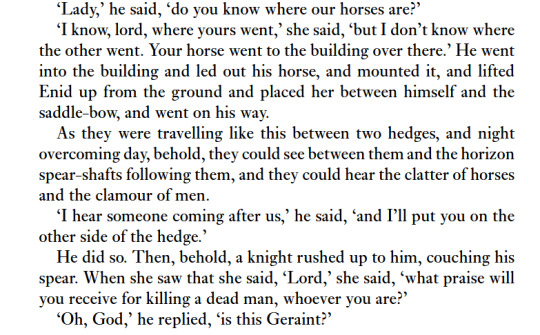
what i like is that not only does the narrative make it clear geraint is being stupid as hell, because he is, but that enid doesn't hate him and for all his stupidity and impulsive anger he doesn't hate her either. they have a very apparent bond that, while i'm not the biggest fan of them as a romantic pairing because geraint is so fucking idiotic, cannot be erased and should not be erased.
#arthuriana#the mabinogion#arthurian mythology#sir geraint#lady enid#though tbh i do have a strong preference for them to be simply close friends not lovers#their romance is very swift even for arthuriana so while maybe with proper development i could see it#at the moment of this tale i think it's best if they've yet to become a couple
4 notes
·
View notes
Text
geraint has some moments i like i'm trying to give him a chance but jeeeeeez. lowkey unpleasant to read. he just reads to me as a really controlling husband with severe anger issues. enid is lovely she has a lot of sense and is looking out for him but geraint has problems
24 notes
·
View notes
Text
Three Welsh Romances
Owain and the Lady of the Fountain

Owain leaves his wife behind to go on an adventure. Feeling neglected, she forbids him to return. He wins back her love with the help of a lion.
Geraint and Enid

Due to a misunderstanding, Geraint believes that Enid has cheated on him, and commands her not to speak to him during their journey. But she proves her fidelity by breaking her silence to save his life.
Peredur and Angharad

Wanting to impress Angharad Golden-Hand, Peredur takes a vow of silence until he wins her affections. She falls in love with him after witnessing his prowess.
(originally posted June 17 2024)
#aneurin barnard#moodboard#three welsh romances#owain#the lady of the fountain#geraint#enid#peredur#angharad#welsh mythology#celtic#arthurian
8 notes
·
View notes
Text
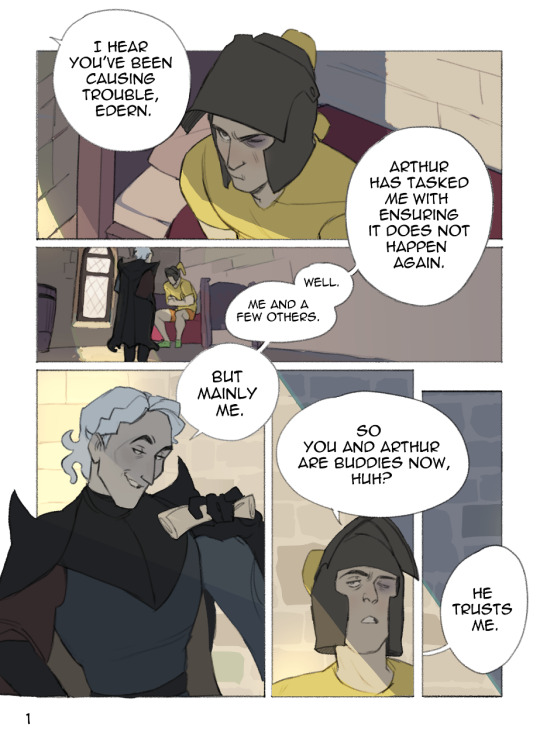
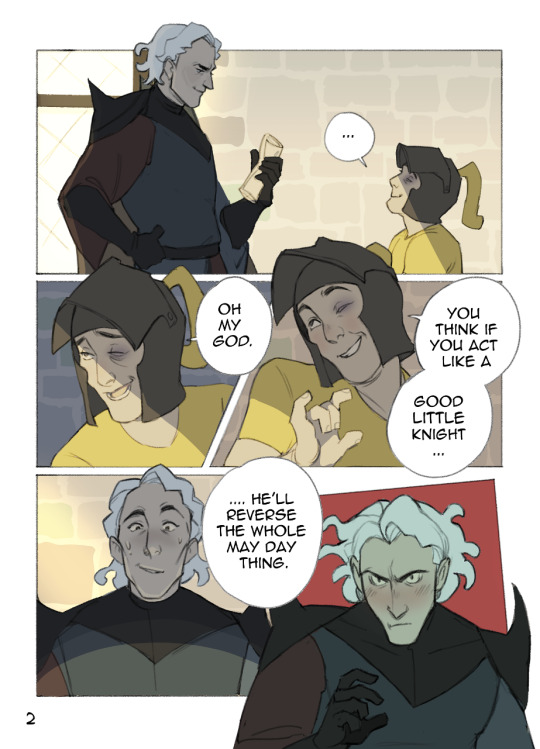
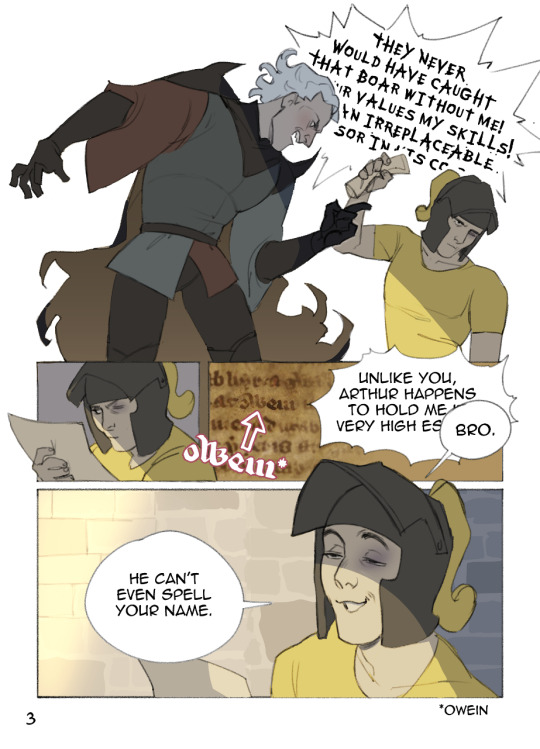
predictably, i'm a fan of the theory that the owain ap nudd mentioned in geraint and enid is a spelling error 😌
#gwyn ap nudd#edern ap nudd#welsh mythology#arthuriana#the mabinogion#geraint ac enid#celtic mythology#comics#artists on tumblr#digital art#art tag#edern can read???
174 notes
·
View notes
Text
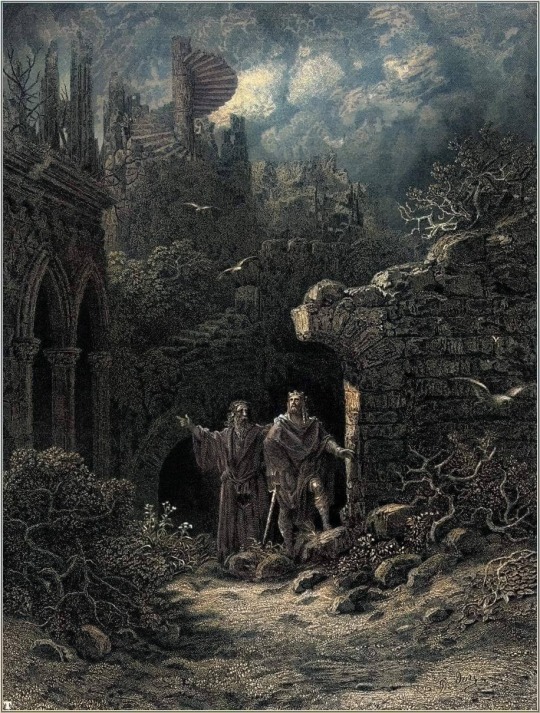
Yniol shows Prince Geraint his Ruined Castle by Gustave Doré
#gustave doré#art#yniol#geraint#arthurian#enid#enide#alfred tennyson#castle#ruins#idylls of the king#alfred lord tennyson#tennyson#matter of britain#britain#british#knight#knights#chivalry#chivalric romance#mythology#castles#europe#european#ruin#lord alfred tennyson#magical#architecture#spiral staircase#spiral stairs
466 notes
·
View notes